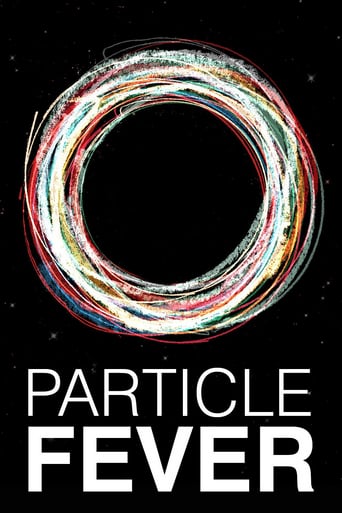

not as good as all the hype
... View MoreNice effects though.
... View MoreExcellent characters with emotional depth. My wife, daughter and granddaughter all enjoyed it...and me, too! Very good movie! You won't be disappointed.
... View MoreEach character in this movie — down to the smallest one — is an individual rather than a type, prone to spontaneous changes of mood and sometimes amusing outbursts of pettiness or ill humor.
... View MoreThere's a lot of talk about how important what they are doing and people congratulating each other, but they don't really explain much of anything. It's not for a lack of time as they spend too much time on long shots of the countryside or segues with meaningless background chatter. Why did they spend so much time on the kickoff party (complete with rapping physicists) when they could have delved into science a lot more? For a "science" documentary, they missed the audience.If it was meant as a human interest story centered around David Kaplan, that failed too. The scientists they spend less time on come across as smart and likable. Not so much Kaplan who barely tries to explain the importance of CERN but wants funding but doesn't want to write grant applications because people just won't understand. So, after complaining that this research needs to be funded because it is so important, Kaplan immediately talks about how his mentor will only allow three co-researchers on any experiment because he couldn't win a Nobel Prize if there were more. This of course begs the question, if the research is so important, why are you limiting the number of people in hopes that you'll win a prize? If you're doing pure research, shouldn't your personnel decisions be based on doing research, not winning prizes?Kaplan may be a very nice guy who isn't actually like this, but the clips the director shows come across that way. Overall, too little information for a science documentary and too boring for a human interest story.
... View MoreThe Large Hadron Collider is a gigantic experimental apparatus, conceived in an attempt to discover the fundamental particles that make up the universe. This documentary about it is relatively light on the physics: in concentrates on the hopes of some of the scientists working on it, conveying their innate excitement for their subject rather than the technical details of how and why. But it does convey some of the reasons why this work is (at least theoretically) important: the Higgs Bosun, the previously elusive particle that was target number one for the LHC, is central to modern physical models of the universe; and moreover, determining its mass would help us choose between two broader theories: one is which the universe exists in a state of perfect symmetry, and the other in which it is just one of a huge array of universes, each with their own peculiar properties. And I think the documentary succeeds in inducing its audience to share these concerns. How this relates to the world as we perceive it on a daily basis is very unclear; but the urge to understand is something very fundamental in our humanity, and 'Particle Fever' conveys this well.
... View MoreThis is not an educational film designed for physicists. Those who say the film is light on science should look to its title: "Particle Fever". What does "fever" refer to? Unbridled emotions--from joy to fear--that accompanied scientists' anticipation of an historic event: the operation of the LHC (Large Hadron Collider) in Meyrin, Switzerland.The film explains how the theoretical basis for the CERN experiments dates back decades. Entire scientific careers have focused on theories that might be perfected or destroyed with data from the LHC.Before I started watching this documentary, I decided that I was looking for clarity regarding the physics behind this endeavor. And I was hoping that the film would be engaging. The film is a success on both points. As a layperson, I could never hope to understand the mathematics of theoretic physics or the mechanics of experimental physics, but this film provides the basics for understanding the issues at play and their magnitude. Using a few "actors" to speak to the camera, especially those with overt enthusiasm and those who have invested their lifetimes in this arena of scientific thought, helped me feel their "fever" and understand the stakes.For the most part, this film is presented chronologically, beginning in 2007 as the LHC becomes operational. History and theory are interspersed throughout the film.The most anticipated results of the LHC data pertained to the Higgs boson, a theoretical particle critical to modern particle theory. Much of the drama, at least for those unfamiliar with the data CERN has provided over the years, concerns this particle.This film also shows the relationship of the scientific community with media, which sometimes has the power to excite popular opinion for better or worse. Information presented about a CERN-like project in Texas illustrates that politics play its part, often controlling the purse strings.On the downside, I found some of the universe theory to be anthropocentric and even anthropomorphic. Also, when Nima A. says it is "incredible" that the laws of nature are understandable via math, I understand what he means, but I wonder if there are other "maths" unavailable to us that could explain those laws of nature that are imperceivable by man. We can know but a small part of the multiverse. This is something astronomers have already accepted.
... View MoreThis film does a great job of documenting the contemporary PR effort necessary to garner the vast amounts of money needed to run experiments about how our universe works. The very telling moment about this PR is when scientists actually consider doing their experiments in secret in the middle of the night, in order to make sure the experiment, portrayed as the actual experiment for the press, will go well the next day. I think this actually occurred though I did not find that part clear in the documentary. Even in simply considering this, portraying essentially falsehood as truth, is mind boggling. One scientist suggests that the press will want to know the real moment something is actually discovered... well, yes, I suppose. :) They might want that truth, history might want that truth. Give the film credit for documenting this incredibly bizarre moment.Also, I learned that "experimentalists" (as opposed to the "theorists") must think Thomas Edison invented the light bulb. There is an apt comparison be made that the press was not called in until something actually worked. Imagine them reporting on each of hundreds of failures. Invention is tedious.However this Edison idea is a confusion of technology (the experimentalists' bailiwick of sorts) with science that the CERN project is supposed to be.Wikipedia: " Edison did not invent the first electric light bulb, but instead invented the first commercially practical incandescent light. Many earlier inventors had previously devised incandescent lamps."One of the flaws of an earlier inventor was the high expense to produce an apparently otherwise working light bulb by the wording. It is not as if the expense of going to the moon is considered in that accomplishment. I sometimes find insight in the smallest of things. Or perhaps I am just sarcastically picking apart things. However, when the light bulb was mentioned as invented by Thomas Edison, I talked back to our TV.Edison was the epitome of what Monsanto, cigarette companies, some trial lawyers in court, and CNN pundit quests rely upon: scientists interested in profit over ideals.The Edison analogy is adept in more than one way.Do the political and commercial (public monies) aspects of this giant project (compared to the Great Pyramids by the scientists involved) make it more susceptible to discovering something that pleases rather than the tells the truth?The "super-symmetric theory" is preferred over the "multiverse theory" by the theorists interviewed. Multiverse theory is basically the idea that there are multiple universes in pure chaos except for our one universe which seems distinctly suited for human life. We are the one in a billion universe that has the right characteristics. The variances are just so in our universe. The chances of human life rest on odds the size of, say, 10 people winning the lottery in the same room who all have red hair, a limp, and a cat named "Bo." Multiverse theory handles this nicely and says that there are a lot of possible existing universes and we happen to be in the one where life was created. If we were not we would not be here.But why do they cheer lead for "supersymmetry?" Well, as I understand it, this theory gives them more things to do with the CERN supercollider in the future, whereas the multiverse theory makes the odds of finding more things higher in other universes we may never know. To me, this is precisely the point. Unless there is some careful plan, one would think we are absolutely fighting the odds if we think things will necessarily be discoverable by a random limited species in a random world.One scientist seemed to link his career into discovering things with correct timing, no less. If not, he would be retired and not be part of it. Another scientist is correct in responding that even if retired, the knowing was more important thing.My understanding of the multiverse and supersymmetric theories was certainly elevated by watching this. There was even a fairly good but concise representation of intelligent design (which is not your local tea party Texas schoolbook concept) but a construct that is fairly difficult to get away from given the unlikely nature of our universe being the way it is by chance. I was stunned to see this discussion, Disregarding politics, this is an actual theory that can be pointed to as the most likely unless it is almost properly ruled out at the beginning as not being science. Again we are not talking about Christianity or any other religion but the simple idea that everything is too precise for random existence.I wondered why the scientists were pushing for the supersymmetric theory over the multiverse theory at all. This was their stated preference in the documentary. Obviously, truth is truth, but in my younger years studying psychology we understood the massive effect that the scientist's preference can have on experimental outcomes. When you also mix in the vast expenditure of public monies and the career trajectories of all the team involved, it is definitely something to consider. It is not as if I feel that they fudged the results but the whole thing seemed a bit orchestrated... and the presentation... completely orchestrated, complete with Dr. Higgs, as touching as that was.The multiverse theory, or complete chaos, seemed to me to be the more likely answer. Why should humanity's thoughts and wishes come into it? Even art, a most human endeavor, has expressed itself with chaos at times."After the discovery of the Higgs particle in 2012, it was expected that super-symmetric particles would be found at CERN, but there has been still no evidence of them."Chaos.../ documentedinsolence.blogspot.com
... View More